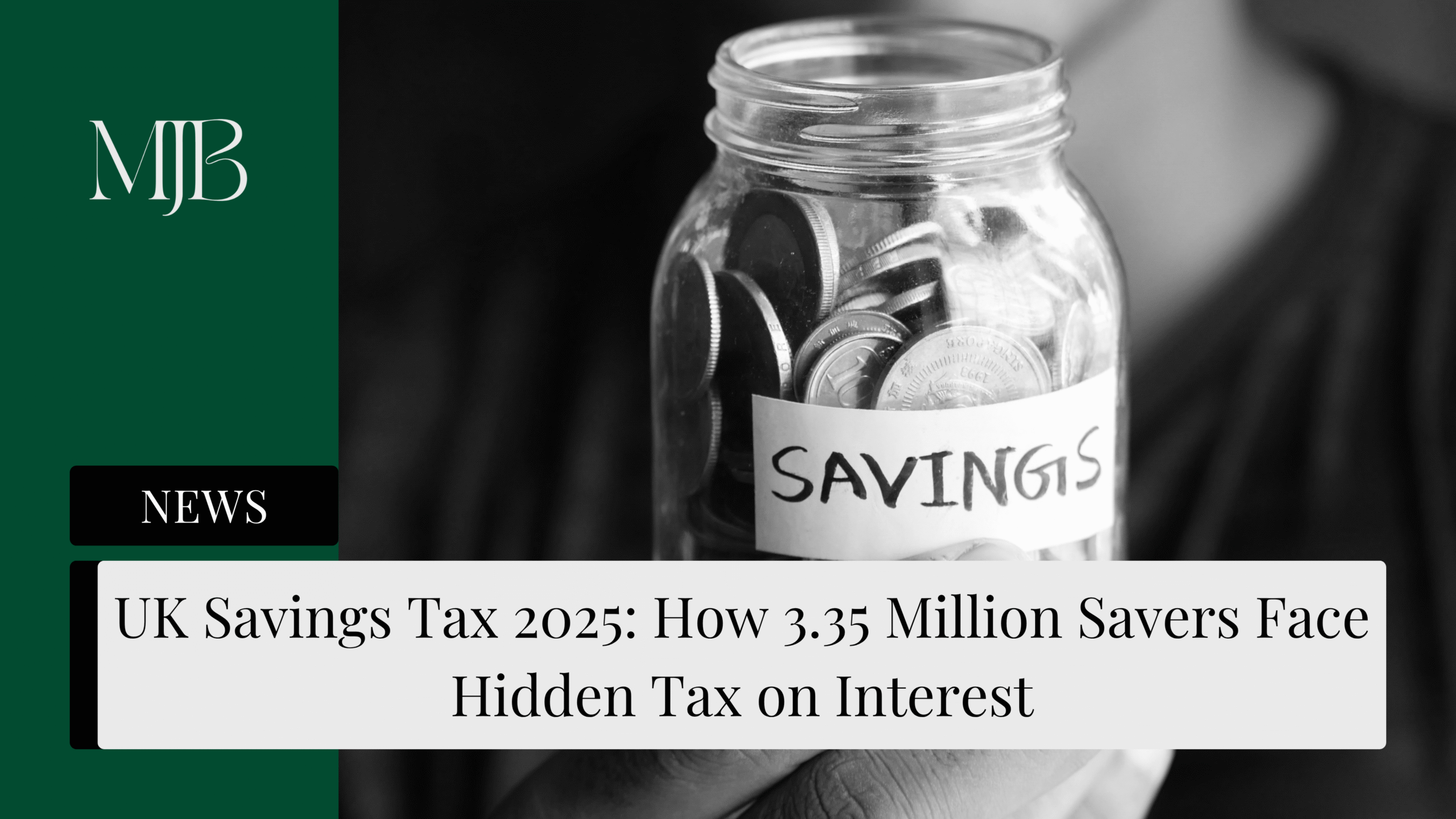Recall when earning interest on your savings was just… free money? Yeah, those days are numbered.
Fresh HMRC data shows over 3.35 million UK savers will pay tax on their savings interest in 2025 — up from 3 million in 2021. That’s right: the government’s coming for your rainy-day fund through what experts call a “stealth tax” on savings, and they’re not even trying to hide it anymore.
How Savings Interest Tax Works in the UK
Here’s the deal: when your savings interest exceeds your Personal Savings Allowance (£1,000 for basic-rate taxpayers, £500 for higher-rate taxpayers), you owe income tax on the excess. Simple enough, except frozen tax thresholds mean more people are hitting these limits without actually getting richer.
Frozen Tax Thresholds Create ‘Fiscal Drag’ for Millions
The culprit? Fiscal drag — the government’s favourite party trick where they freeze income tax bands while inflation pushes your earnings higher. Former Chancellor Jeremy Hunt extended this threshold freeze until 2028, and while PM Keir Starmer promises no income tax rate hikes, he’s suspiciously quiet about extending the freeze further.
Translation: you’re probably paying more tax on savings interest without realising it.
The Numbers Don’t Lie
Let’s talk scale. Nearly 40 million people will pay income tax in 2025-26, compared to 34.5 million just three years ago. That’s 5.5 million extra taxpayers funding the Treasury’s £330 billion income tax haul.
And savings interest? It’s the sneaky addition nobody saw coming. After years of pitiful returns, higher interest rates should be good news for savers. Instead, they’ve become a tax trap.
Cash ISAs: Your Tax-Free Savings Shield in 2025
Harriet Guevara from Nottingham Building Society calls this a “hidden tax burden on ordinary savers” — and she’s not wrong. While families scramble to build emergency funds amid the cost of living crisis, the government’s essentially taxing financial responsibility.
The solution? Cash ISAs remain your best defence against savings tax, letting you shelter up to £20,000 annually from HMRC. Chancellor Rachel Reeves recently shelved plans to slash the ISA allowance after banks and building societies raised hell, warning it could derail Labour’s homebuilding targets.
Why? Because your ISA savings help banks lend for mortgages. Cut the ISA limit, and suddenly loans get pricier and harder to find. Who knew your savings account was propping up the housing market?
How to Avoid Tax on Savings Interest: Practical Steps
First, check if you’re affected. If your savings account is earning decent interest rates (finally!), you might be closer to the Personal Savings Allowance threshold than you think.
Second, maximise your ISA allowance if you haven’t already. The £20,000 annual ISA limit offers literally free tax protection — use it or lose it each April.
Third, consider splitting savings between partners if you’re married or in a civil partnership. Two Personal Savings Allowances beat one, potentially doubling your tax-free interest to £2,000.
The bottom line? This “stealth tax” on savings isn’t going anywhere, and with 40 million taxpayers on the hook by 2026, the government’s clearly betting on inertia. Don’t let them win — protect your savings interest from tax while you still can.
FAQ
Q1: How much savings interest can I earn tax-free in the UK?
A: Basic-rate taxpayers get a £1,000 Personal Savings Allowance, higher-rate taxpayers get £500, and additional-rate taxpayers get nothing. Any interest above these limits gets taxed at your marginal income tax rate.
Q2: Does this affect my workplace pension?
A: No, this specifically targets savings account interest. Pension contributions remain tax-efficient, though different rules apply to pension withdrawals.
Q3: Do I need to declare savings interest to HMRC?
A: HMRC receives data directly from banks and building societies about your interest earnings. They’ll know if you owe tax on savings and will adjust your tax code or send you a self-assessment bill.
Q4: Are NS&I Premium Bonds affected by savings tax?
A: Premium Bond prizes are completely tax-free, making them increasingly attractive as savings rates rise. The trade-off is variable returns versus guaranteed interest from traditional savings accounts.
Q5: Should I switch everything to stocks and shares?
A: Not necessarily. Emergency funds need instant access, which savings provide. Consider a balanced approach using both ISA types for different goals.
DISCLAIMER
Effective Date: 15th July 2025
The information provided on this website is for informational and educational purposes only and reflects the personal opinions of the author(s). It is not intended as financial, investment, tax, or legal advice.
We are not certified financial advisers. None of the content on this website constitutes a recommendation to buy, sell, or hold any financial product, asset, or service. You should not rely on any information provided here to make financial decisions.
We strongly recommend that you:
- Conduct your own research and due diligence
- Consult with a qualified financial adviser or professional before making any investment or financial decisions
While we strive to ensure that all information is accurate and up to date, we make no guarantees about the completeness, reliability, or suitability of any content on this site.
By using this website, you acknowledge and agree that we are not responsible for any financial loss, damage, or decisions made based on the content presented.






